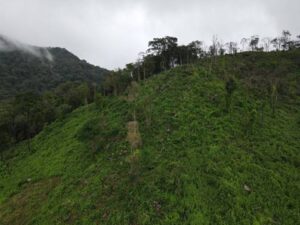As climate change impacts and anthropogenic activities continue to take their toll on the world, environmental resources continue to dwindle, leaving people and the planet in dire need.
In Sierra Leone for example, we have seen over the years how harmful economic activities like deforestation, stone and sand mining, charcoal production, encroachment, bushfires, and farming activities have badly affected the water and land resources within the Western Area Peninsula National Park (WAPNP), thus threatening the livelihood of communities and Freetown’s water supply.
To find a solution to these problems, Sierra Leone for the first time participated in the UNESCO Intergovernmental Hydrological Program (IHP) regional workshop on Strengthening the Ecohydrological Approach as a Tool for Enhancing Water Quality in West Africa, in July 2021. The workshop was about appreciating and optimizing ecosystem services for society along with enhancing the resilience of river basins to climatic and anthropogenic (manmade) stress, to allow water and land resources to complement one another in subsistence and protection.
After the workshop, participating governments were encouraged to establish ecohydrology demonstration sites in their respective countries. Ishmail Kamara is the Hydrological Services Manager at the National Water Resources Management Agency (NWRMA). He was a delegate at the workshop in Abuja, Nigeria. He says a demonstration site is a water catchment or river basin where ecohydrological approaches that are related to water are implemented to promote Integrated Water Resources Management (IWRM) to address social and environmental issues.
“Water nourishes the vegetation, and the vegetation also helps to protect and purify water. Without one, the other would die. Ecohydrology principles, a new scientific approach, explore the relationship between hydrological and biological processes to improve water quality and quantity, and biodiversity enrichment to fix big issues like water insecurity, deforestation, climate change impact, biodiversity degradation, and many more. This way, we hope to secure WAPNP and the needs of water users.” Kamara said.
In January 2023, Sierra Leone became the 3rd African country (joining Ethiopia and Kenya) to have a recognized UNESCO-IHP Ecohydrology demonstration site: the Western Area Peninsula Water Fund which is found in the Western Area Peninsula Water Park (WAPNP). The approval is preceded by an application made in November 2022 by the Government of Sierra Leone, through NWRMA. Sierra Leone was selected by UNESCO’s Scientific Advisory Committee (SAC) in Paris.

In a letter of acceptance, Dr Rahmah Elfithri Chief of Capacity Development and Water Family Coordination (CDW) section at the UNESCO Division of Water Sciences Intergovernmental Hydrological Programme welcomed Sierra Leone to the global network of ecohydrology demonstration sites and said the application was considered and approved because:
- It applies traditional and straightforward approaches of reforestation and forest protection to protect biodiversity and more naturally regulate runoff and reduce erosion and sediment loads in rivers. At the same time, it does consider well the themes of water, biodiversity, ecosystem services and resilience.
- At large spatial scales, such as this site (183km2), restoration of naturalness is already a rather significant goal and achievement.
- The efforts are also linked to very solid international organizations and are likely to continue to yield fruit in the years to come (and not become an inactive demo site)
UNESCO-IHP was established in 1975 as an intergovernmental system dedicated to research, management, education and capacity building in hydrology. It developed Ecohydrology as a transdisciplinary, scientific approach to achieve water quality improvement, biodiversity enhancement and sustainable development by using the understanding of relationships between hydrological and biological processes at the scale of water catchment basins. The Ecohydrology programme promotes the integration of social, ecological and hydrological research, and generates outcomes that enable the development of effective policies and practices for integrated water resources management. Read more here

